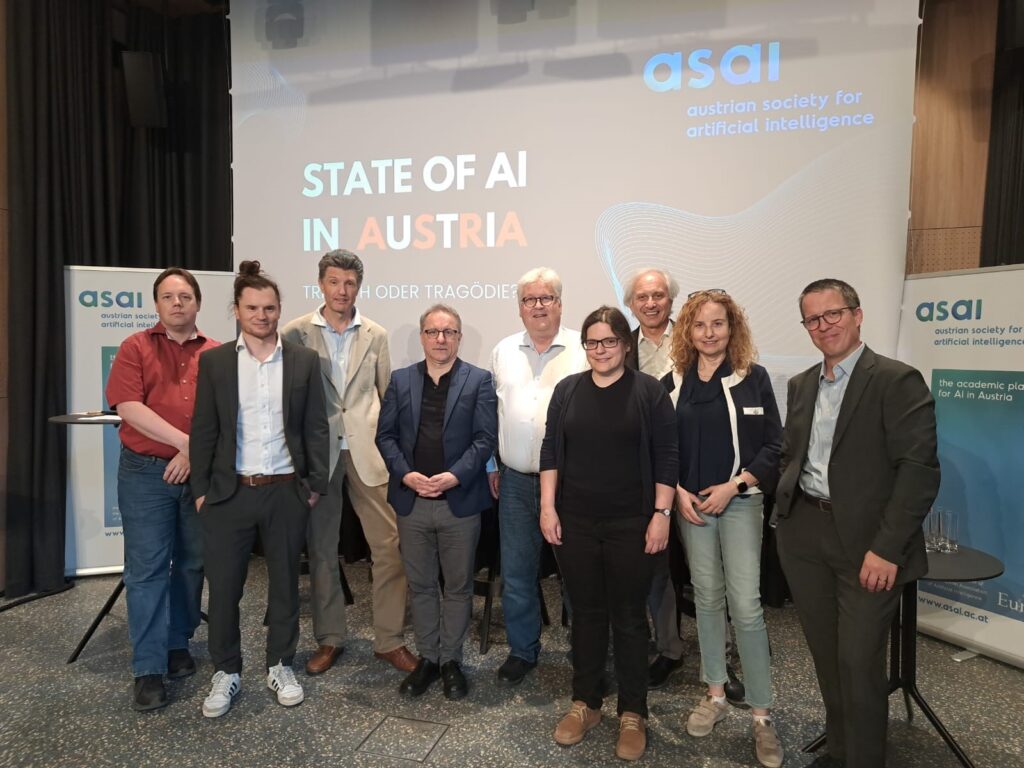State of AI in Austria – Triumph or Tragedy?
On June 14, 2023, the Austrian Society for Artificial Intelligence (ASAI) organized a press conference to discuss the state of AI in Austria. VCLA co-chair Agata Ciabattoni and board member Thomas Eiter were among the leading Austrian researchers who offered their view on the current state of affairs.

Christoph Lampert, Günter Klambauer, Thomas Eiter, Bernhard Moser, Sepp Hochreiter, Martina Seidl, Gerhard Friedrich, Agata Ciabattoni, Axel Polleres (left to right)
“While Austria plays in the Champions League with regard to its expertise in Artificial Intelligence, it plays in the District League with regard to financial means”, lamented Sepp Hochreiter (JKU – Institute for Machine Learning). Hochreiter has developed an Austrian version of ChatGPT that he believes is superior to its OpenAI counterpart. However, he explained that Austria could not provide him with the resources for further testing, and that he might therefore have to accept offers from other countries such as Germany or Saudi Arabia. While this was not a problem for him personally, he felt let down by the government and saw it as a missed opportunity for Austria to become a leader in the field of AI.
Thomas Eiter (TU Wien – Institute of Logic and Computation) emphasized that Austria was renowned for its excellence in AI research, but likewise lamented the scarcity of resources that made it difficult to keep up with competitors from abroad. Eiter reported that after graduating from university, many students were leaving Austria due to limited opportunities and a lack of perspective; also, he told the audience that a newly hired Post-Doc had resigned from his job after learning that he was also tasked with teaching responsibilities and could not focus exclusively on his research. Martina Seidl (JKU – Institute for Symbolic Artificial Intelligence) added that Austrian students were recruited by prestigious universities such as Stanford, which goes to show that their education was considered to be excellent.
Christoph Lampert (ISTA – Machine Learning and Computer Vision Group) appealed to journalists to present a balanced view of AI in the media. Clearly, AI was associated with risks and was therefore often met with skepticism, but it also had great potential that should not be overlooked. In Lampert’s view, journalists could act as opinion leaders and highlight the positive aspects of AI. Similarly, Martina Seidl called for exploiting the full power of AI, e.g., in the world of business. She believes that companies can benefit from digitization by bringing order into (data) chaos and optimizing processes, and Günter Klambauer (JKU – Institute for Machine Learning) mentioned that there were applications for AI in medicine and healthcare. In this respect, Gerhard Friedrich (AAU – Department for AI and Cyber Security) shared his experience from working in a research department at Siemens, where he cooperated closely with researchers from academia. Friedrich made a valid point when saying that Mozart, the Lipizzaner horses, and the Wörthersee lake were not enough to attract and keep good personnel, and that Austria should not miss the (AI) train that was quickly picking up speed.
Sepp Hochreiter shared that he had had talks with the President of Austria’s National Council and Austria’s State Secretary for Digitization. While they had been generally willing to support his efforts, this support would take some time as they had to await budget negotiations (and to use Friedrich’s metaphor, the train may have left the station by then). Eiter added that funds were getting smaller, and that bigger initiatives and well-targeted support were needed, and this would eventually result in a substantial return on investment. Friedrich called for incentives such as a cluster of excellence to provide researchers with networking opportunities. When asked how much money was needed, Hochreiter gave a ballpark figure of EUR 500 million as a bare minimum – and this budget should be dedicated exclusively to basic research in AI. Agata Ciabattoni (TU Wien – Theory and Logic Group, Co-chair of VCLA) underlined the importance of basic research by a comparison with the development of computers; many believe that the current developments in AI are an equally revolutionary step in the advancement of humanity. In fact, Bernhard Nessler (Software Competence Center Hagenberg) stated that a strategy paper for basic AI research had been submitted to the ministry four years ago, but up to now, this call for action had largely passed unnoticed.
Another issue raised at the press conference was the limited IT infrastructure in Austria. Nessler criticized the scarcity of GPUs available to Austrian researchers, and Robert Legenstein (TU Graz – Institute of Theoretical Computer Science) added that applicants had expressed their dissatisfaction with local computing capacity in job interviews. According to Axel Polleres (WU Vienna – Institute for Data, Process, and Knowledge Management), scientists who had left for Amazon or Google were now willing to return to Austria due to layoffs or for personal reasons. However, Austria needed to provide a more attractive research environment, and IT infrastructure was an important part of that.
More information:
